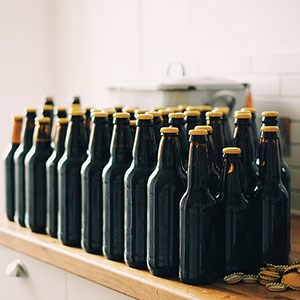Cider’s coming of age

Sweden possesses a bounty of apples, and the fruit is a beloved staple in the production of both food and drink. Apple sauce, apple cake and apple juice count among many peoples’ favourites. One apple product has long since been absent from the Swedish market however: the classic cider.
Historically, there has been no tradition of genuine cider production in Sweden and much of the cider that is on the market sees a high variance in actual apple content. The term cider in Swedish spans a wide range of definitions. It encompasses both the sweet mass-produced variety – which is often marketed as an alternative to soft drinks – as well as the classic cider. Increasing producer awareness, as to the possibilities of making different grades and flavours of cider made entirely from Swedish apples, would not only help market classic cider more effectively. It would also increase consumer awareness of what differentiates classic cider from the mass-produced variety.
– Many consumers simply don’t know what classic cider is and what its qualities are, states SLU researcher Kimmo Rumpunen at the Department of Plant Breeding. The classic cider is made from fermented juice of apples with no additives. It can range from dry to varying degrees of sweet.
Different varieties of apples possess different qualities, making them more or less suited for use in different forms of production. The majority of the apples grown in Sweden today are dessert apples that are either eaten raw as table fruit or turned into products such as apple juice (called must in Swedish, Ed.). Some of these apples however, are now starting to find their way into cider production.
– Cider apples differ from dessert apples since they contain more acidic compounds and tannins, says Kimmo Rumpunen. This is a requirement when making traditional cider since it affects the fermentation process and creates different characteristic aromas compared to dessert apples. Different blends of juice from dessert and cider apples holds great potential for developing palatable new products.
Working together with SLU colleagues, Kimmo Rumpunen has examined how older English and French varieties of cider apples fare under conditions prevalent in Sweden as part of project Cideräpplen i Sverige. The results showed these varieties to yield a delayed harvest as well as being susceptible to disease when cultivated under local conditions. Breeding programmes to yield a new hybrid variety adapted to these conditions are underway as part of project Framtidens äpple.
Plant material adapted for local climate holds great benefits in the form of higher yield as well as increased crop safety for growers and producers. There are economic benefits to be had as well, when a larger portion of the total harvest can be put towards beverage production.
Growers, beverage producers and consumers alike currently show a growing interest in cider.
Marcus Callenbring, owner of Stora Juleboda orchard in coastal Maglehem of east Skåne, is one of them.
– Cider is delicious, and we grow a lot of apples and pears at our place. Five or six years ago we also planted 5000 cider apple trees, Marcus Callenbring explains. We grafted 12 different varieties onto wild cultivars and this year we got our first harvest.
– With the growing interest for making cider, it is an advantage for us to not have an established tradition of production. It allows us to freely shape the products we want to make, with both stronger and lighter ciders in terms of alcohol content. These will differ from the ciders produced in France, England and the north of Spain simply because the different weather conditions and soil here give our apples different properties.
Kimmo Rumpunen is also engaged in project Östra Skåne – ett nav för svensk ciderproduction with the aim of strengthening the apple industry in the region as a whole.
– We want to inspire more people to invest in cider production, raise product quality as well as find ways for producers to raise profits and minimise risk. With a legalisation for producers to sell their products on site (currently not legal for any alcoholic beverages, Ed.), we could see strong opportunities not only for better sales but for a tourism industry as well, says Kimmo Rumpunen. Small-scale producers have had a hard time on the market because they compete with the mass-produced bulk volume of sweet cider. The legislation surrounding the sale of alcoholic beverages has also made it difficult for these producers to turn a profit.
– We’ve been making cider on a small scale here for years, Marcus Callenbring says. If on-site sales become legalised we would feel confident about making bigger investments. At that stage, I think cider production would become the pillar of our operation.
Links:
Visit slu.se/apple for more articles on apples.